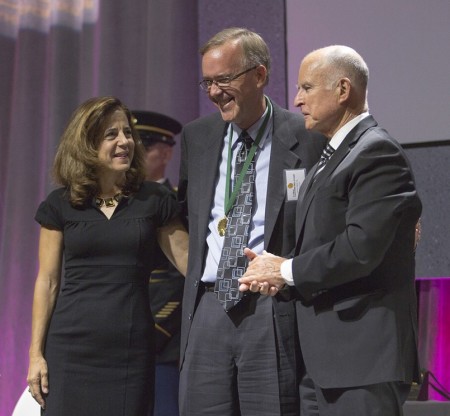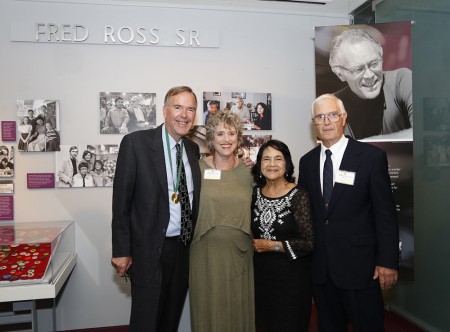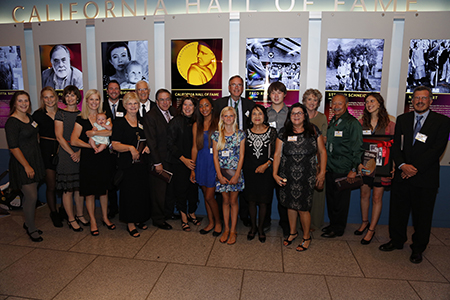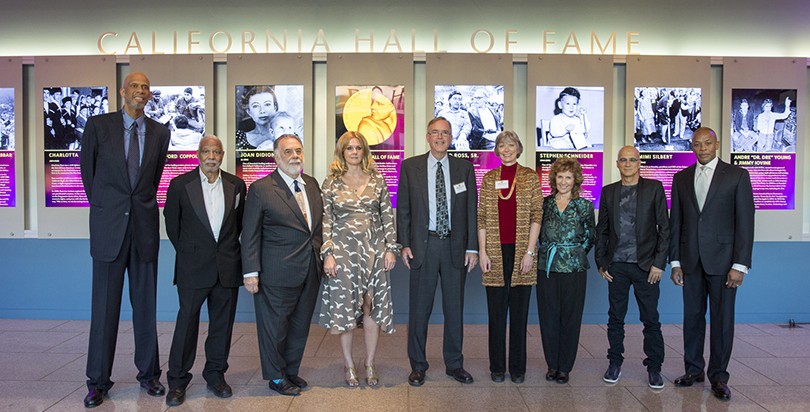
Fred Ross Jr (center) accepts the award on his father’s behalf from Gov. Jerry Brown and his wife, Anne Gust Brown. Photo by Peter A. Williams. © The California Museum
Renowned union organizer and activist Fred Ross Sr was posthumously inducted into the California Hall of Fame on October 1. The Hall of Fame honors “legendary people who embody California’s innovative spirit and have made their mark on history.” Ross was just one of the many notable Californians inducted that evening, along with Kareem Abdul-Jabar, Charlotta Bass, Francis Ford Coppola, Joan Didion, Jimmy Iovine, Stephen Schneider, Mimi Silbert and Andre “Dr. Dre” Young.
Considered one of the trailblazers of the modern American Labor Movement, Ross began his storied career organizing “Dust Bowl” refugees in California’s migratory worker camps in the 1930s. During World War II, Ross worked to combat prejudice against Japanese Americans and help them find jobs and housing upon their release from the internment camps. After the war, in the face of Ku Klux Klan activity, Ross organized eight Civic Unity Leagues in California’s Citrus Belt, bringing Mexican Americans and African Americans together to battle segregation in schools, skating rinks and movie theaters. One of the most dramatic outcomes of his work in Orange County occurred when parents sued the School Districts and prevailed. (Mendez et al vs. Westminster School District, et al.), creating the legal precedent and laying the foundation for the landmark Brown vs. the Board of Education decision.

From left: Fred Ross Jr with sister Julia Ross, labor leader Dolores Huerta and brother Bob Ross, in front of the Fred Ross Sr exhibit at the California Museum. Photo by Peter A. Williams. © The California Museum
In the 1950s, Ross met César Chávez, Dolores Huerta and Gilbert Padilla and recruited them to the Community Service Organization (CSO). Together with other CSO leaders across California and Arizona, they successfully overcame voter suppression efforts and passed landmark legislation on behalf of immigrants, notwithstanding the pervasive climate of fear characteristic of the McCarthy era.
In 1966, Chávez tapped Ross to become the full-time organizing director for the United Farmworkers, where he trained and mentored thousands of union organizers and future leaders, including his son, Fred Ross Jr. He also worked closely with IBEW 1245 Business Manager Tom Dalzell.
“In my eight years with the UFW legal department, I observed Fred Ross Sr’s leadership on the front lines of strikes and during the historic grape boycott,” said Dalzell. “Perhaps his most lasting impact from the farm worker days is still being felt here at Local 1245 and across the labor movement through the work of the organizers he trained.”
At the Hall of Fame ceremony, IBEW 1245 Organizer Fred Ross Jr, accepted the Spirit of California medal on his father’s behalf from Governor Jerry Brown and First Lady Anne Gust Brown.
Emerson Wilkens, nephew of posthumous inductee and pioneering African American civil rights activist Charlotta Bass, introduced Ross at the ceremony and had this to say about his legacy:
It’s a strange measure of success to remain anonymous, but for Fred Ross, being in the background was proof of his great accomplishments. Fred once said: “An organizer is a leader who does not lead but gets behind the people and pushes.” He was so effective at pushing other people out in front of him, that he pushed himself right out of most history books. But where we see a better, more equal, more compassionate society, we see Fred’s work.
He spent his life grappling with the most important issues of the day. He sang songs with Woody Guthrie and strategized with Saul Alinsky, tossed out racist politicians and helped build the most powerful Mexican American organization in the country. Fred was also an early gender progressive who cultivated and trained a generation of female leaders and activists. He was clearly among the most influential American organizers of the 20th century, and his legacy of social justice continues to grow.

